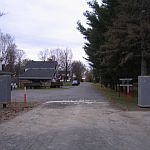 (HOST) Drive through almost any small town hugging the Canadian border these days, and you’ll see freshly painted signs warning you against illegal crossing.
(HOST) Drive through almost any small town hugging the Canadian border these days, and you’ll see freshly painted signs warning you against illegal crossing.
And now, the Department of Homeland Security is closing side streets that have always allowed Vermonters and Canadians to mingle easily.
Some see that as an end of an era.
Charlotte Albright reports from Derby Line.
(Albright) On a drizzly late fall afternoon, Lindsay Smith, of Stanstead, Quebec, is visiting his daughter, Robin, at her snug white house in Derby Line, Vermont. He could have walked about a half mile up a hill to see her. But instead, he had to take a roundabout route by car so he could pass the Homeland Security checkpoint.
That’s one reason, at the age of seventy five, he got a passport. But unlike a lot of his older friends, Smith is not all that upset about new granite and wrought iron gates sprouting in the middle of two back streets linking his house to his daughter’s.
(Smith) "At first, I didn’t agree with it, but now I’m sort of going along with it. I’ve met the Homeland Security fellows and it’ll be all right as far as I’m concerned."
(Albright) For Smith, the gates themselves are minor nuisances compared to the bigger changes that occurred shortly after 9-11. That’s when people who used to think nothing of popping across the border for lunch or a haircut started staying put, because they didn’t want to bother getting a passport. Or they didn’t like being harshly questioned and searched at the checkpoints. Now, Smith says, the border agents have learned some manners, and if social life is getting chilled out-well, he figures that’s the price of public safety. As for smugglers, though. . .
(Smith) "They’re gonna find another way, somehow."
(Albright) But at least, Smith figures, they won’t be leading patrols on high speed chases through his quiet neighborhood.
Smith’s daughter Robin, a reporter for a local newspaper, is also more or less resigned to the new gates.
They’re solar powered, and can be opened by a remote control key that will be handed out to fire fighters, plow drivers, and ambulance drivers. Still, Robin Smith worries that if a public emergency is declared-like a flu epidemic, or a heightened security alert– she’ll be stuck.
(Robin Smith) "I don’t know which side of the line I’ll be on. My work and my house is on one side and my family is on the other. So I kind of wonder, will I be sitting at their kitchen table wondering if I’ll get home that night?"
(Albright) Robin Smith agrees with her dad that the new gates won’t change their lives all that much, but they do symbolize the way border life has changed, possibly forever. She misses the days when she could treat the boundary as an invisible line between friends.
(Robin Smith) "The gates will be the physical presence of a restriction that’s existed for a few years; already the locals know you shouldn’t cross there and the only people who do are people smuggling and tourists who don’t know where they’re going."
(Albright) Like me, when I turned down the wrong street and immediately found myself pursed by a border patrol car. "You’re a perfect example of why we need these gates," the agent scolded.
But if the gates solve security problems, they could exacerbate a decline in commerce.
Town trustee Keith Beadle fought the high-tech barriers at first, but is now grudgingly accepting even though he’d rather see that $14,000 in tax money help local businesses affected by the all new border restrictions.
(Beadle) "If you have a business usually you can draw on a circle of three hundred sixty degrees for your customers, but here in Derby Line we only have one hundred eighty degrees because we are right up against the border and we can’t count on having a lot of Canadian customers coming over here other than for buying gas and getting a gallon of milk."
(Albright) As for border scofflaws, Homeland Security spokesman Mark Henry admits closing these streets may not stop them, but it will make their escape more difficult, if they decide to pick a less guarded route:
(Henry) "Should you go out farther to other areas that are more difficult to traverse, that gives us more time to encounter these people and harder for them to get away."
(Albright) Henry says "hundreds" of illegal immigrants were nabbed in this area over the past year or so, some in large vans, and several carrying Google maps pinpointing the two tree-lined residential streets now being closed. He expects the gates to be ready to block cars in another week or so.
For VPR News, I’m Charlotte Albright, in Derby Line.